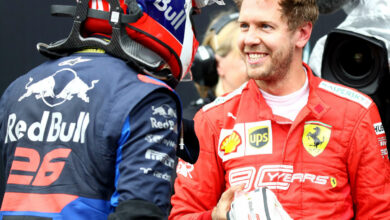Toto Wolff Highlights Impeding Issues in F1: Hamilton’s Q3 Chances Compromised at Zandvoort
In a recent interview, Toto Wolff, the Mercedes team principal, addressed the impeding problems in Formula 1 qualifying, specifically how it affected Lewis Hamilton’s performance at Zandvoort. Wolff pointed out that unfair track traffic and lack of penalties are key issues, as Hamilton missed out on Q3 while his teammate George Russell showcased the W14’s capabilities.
Key Takeaways:
- Mercedes Team Principal Toto Wolff raises concerns over impeding in F1 qualifying: Wolff emphasises the significant impact of track traffic and impeding during qualifying sessions, stating it as a major factor that hindered Lewis Hamilton’s progression into Q3 at Zandvoort.
- Contrasting fortunes for Mercedes drivers: While Hamilton was impeded and started 13th, his teammate George Russell displayed strong performance, qualifying for Q3 and starting third on the grid, indicating the potential of their W14 car.
- Wolff advocates for stricter penalties: In his interview with GPblog, Wolff suggests penalizing drivers for impeding as a solution, likening the lack of current penalties to a situation where tax evasion goes unpunished.

In a detailed conversation with GPblog, Toto Wolff, the head of the Mercedes Formula 1 team, expressed his dissatisfaction with the current state of impeding in F1 qualifying rounds. He specifically mentioned how this issue adversely affected Lewis Hamilton during the recent event at Zandvoort, resulting in Hamilton starting in a disadvantageous 13th position. Wolff’s comments highlight a growing concern in the sport about the fairness and regulation of track conduct during crucial moments such as qualifying sessions.
Wolff compared the situation to tax evasion, implying that the absence of repercussions encourages the behavior. He suggested a more stringent approach to penalizing impeding as a potential remedy. “I think the answer is to penalize. If you know you don’t go to prison when you cheat the tax, you cheat the tax. I don’t understand why these things are not penalized,” Wolff stated.
This situation at Zandvoort serves as a significant example of how traffic and impeding can alter the course of a race weekend. While Hamilton faced difficulties, his teammate George Russell demonstrated the performance capabilities of their car, the W14, by advancing into Q3 and securing a third-place start. This contrast between the two drivers’ experiences underscores the unpredictability and competitive nature of Formula 1, where even the most skilled drivers can find their efforts thwarted by external factors like impeding.
Wolff’s comments have sparked a broader discussion in the F1 community about the importance of fair play and the need for effective regulation during qualifying rounds. As the season progresses, it will be interesting to see how the governing body responds to these concerns and whether any changes will be implemented to address the issue of impeding in future races.



